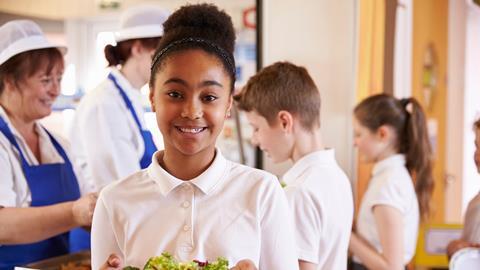Significant majority of Labour voters and over half of Conservatives back extending Free School Meals to more children, with some Tory voters saying a Labour commitment could help swing their vote
Expanding access to Free School Meals is overwhelmingly supported by Labour and Conservative target voters, according to new research from the School Food Review Working Group.
Polling found that 82 per cent of prospective Labour voters and over half of prospective Conservative voters (53 per cent) are in favour of extending free school meals immediately to all children from families receiving Universal Credit, followed by a future expansion to all school children.
The new research, commissioned by the School Food Review Working Group, comes as universal primary Free School Meals are rolled out across London for a year-long pilot.
The School Food Review Working Group, a coalition of 30 organisations from across the school food system, found that the majority of respondents (71 per cent), including both Conservative and Labour voters, think the current income threshold is inadequate or should not exist at all.
The full polling questions and data is available here.
#FeedtheFuture campaigners are calling on both the Conservative and Labour parties to commit to nationally expanding the eligibility to all children, urgently targeting those in households receiving Universal Credit as a priority. The Liberal Democrats and Green Party have already stated their support for this policy.
At present, only children from households with an income below £7,400 a year (after tax and benefits) are eligible. This has not increased since 2018 despite prices rising and it means that an estimated 900,000 schoolchildren living in poverty are not eligible.
Anna Taylor, executive director of The Food Foundation, commented: “This research has an instructive new finding. People now believe that children eating well in school to support their learning is so important that it would affect which party they vote for in the next election. It’s a clear signal that the status quo is both unfair and damaging, and voters want it fixed.”
Chef and campaigner Jamie Oliver added: “It’s great to see that voters across all parties want to put child health first. This reflects what I’m hearing across all my social channels – it’s time to prioritise our children’s health.
“We know that nourishing young minds with nutritious food is an investment in their future, boosts our economy and our health. Sadiq Khan has recognised this by giving all primary school children a free school meal and now we need politicians across all parties to put child health above politics and act now.”
Motivating swing voters
Free School Meals have been a cornerstone of the UK’s state education system since 1906 and, over the decades, every political party has supported the policy’s progress. However, the leaders of both main parties are now coming under increasing pressure from their own backbench MPs, party members and constituents to expand Free School Meal eligibility.
The Liberal Democrats and Green Party already support eligibility extension but so far, neither Labour nor the Conservatives have made any concrete commitments. This is despite strong evidence that an expanded programme would result in improved educational and health outcomes, and longer-term economic prosperity.
In the study by the School Food Review Working Group respondents were asked how Labour adopting a policy to extend Free School Meals would affect their future voting intentions.
In the case that Labour committed to extending Free School Meals to all children on Universal credit immediately and in the long-term provided them for all children in primary and secondary education:
65 per cent of prospective Labour voters would be more likely to vote for the party, as well as 64 per cent of 2019 Labour voters.
23 per cent of 2019 Conservative voters and 18 per cent of those who intend to vote Conservative would be more likely to switch to Labour.
Undecided voters would be far more likely to vote Labour than not.
The results suggest that supporting Free School Meal expansion could help swing significant support for Labour or cost the Tories votes from their previous voters.
Various health, educational and economic benefits
As of this week (commencing 4 September), all primary school children in London are now eligible for free school meals for this academic year, meaning 287,000 more will have access.
The Food Foundation emphasised that the benefits of Free School Meals “have long been proven, with children found to be healthier and happier, able to do better in school and in the long-term earn more over their lifetime”.
While the London trial has been welcomed by campaigners, they warn that a lack of action on a national scale is unfair and will exacerbate regional inequalities.
York councillor Bob Webb echoed these concerns, saying: “At the recent election in York, people told us that Free School Meals made sense. Families across York supported our ambition to mobilise the City to provide these meals and we intend to start a pilot programme to see what can work.
“It is immensely frustrating that some parts of the United Kingdom will receive funding for this, yet children in the majority of England are not being fed due to the Government’s political choice; a choice that we proved the majority of people in York don’t support.”
Recent research commissioned by Impact on Urban Health quantified for the first time the economic benefits of extending Free School Meals. It found that expanding Free School Meals to all school children could generate nearly £100bn for the economy over 20 years.
For every £1 invested, £1.71 would be generated in core benefits driven by improved health, education and employment outcomes, according to the study. If the policy was expanded to all children on Universal Credit, then for every £1 invested, £1.38 would be returned.
Jamie Oliver and other supporters and campaigners celebrated the first week of the London trial by posting on social media using the hashtag #JoinTheJoyscroll.




